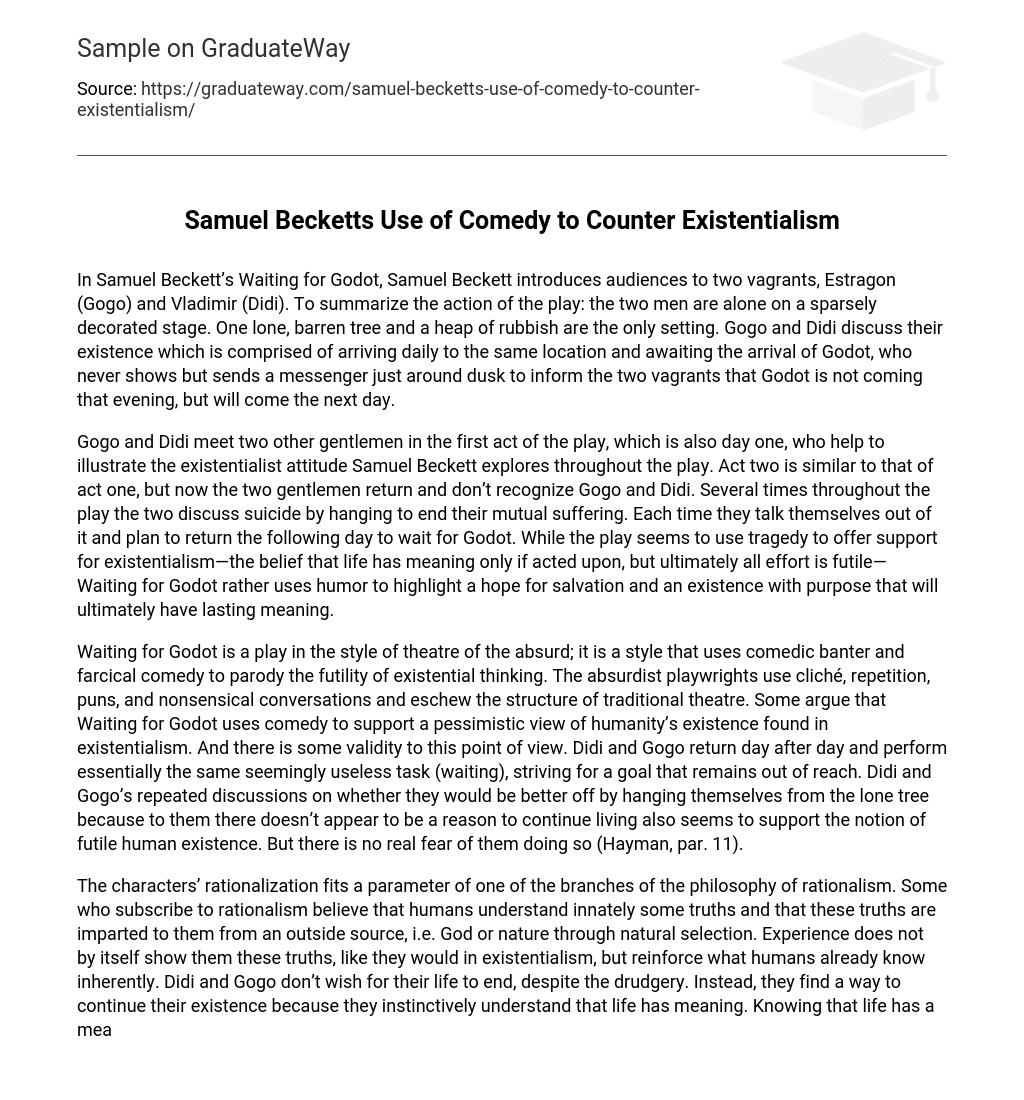In Samuel Beckett’s Waiting for Godot, Samuel Beckett introduces audiences to two vagrants, Estragon (Gogo) and Vladimir (Didi). To summarize the action of the play: the two men are alone on a sparsely decorated stage. One lone, barren tree and a heap of rubbish are the only setting. Gogo and Didi discuss their existence which is comprised of arriving daily to the same location and awaiting the arrival of Godot, who never shows but sends a messenger just around dusk to inform the two vagrants that Godot is not coming that evening, but will come the next day.
Gogo and Didi meet two other gentlemen in the first act of the play, which is also day one, who help to illustrate the existentialist attitude Samuel Beckett explores throughout the play. Act two is similar to that of act one, but now the two gentlemen return and don’t recognize Gogo and Didi. Several times throughout the play the two discuss suicide by hanging to end their mutual suffering. Each time they talk themselves out of it and plan to return the following day to wait for Godot. While the play seems to use tragedy to offer support for existentialism—the belief that life has meaning only if acted upon, but ultimately all effort is futile—Waiting for Godot rather uses humor to highlight a hope for salvation and an existence with purpose that will ultimately have lasting meaning.
Waiting for Godot is a play in the style of theatre of the absurd; it is a style that uses comedic banter and farcical comedy to parody the futility of existential thinking. The absurdist playwrights use cliché, repetition, puns, and nonsensical conversations and eschew the structure of traditional theatre. Some argue that Waiting for Godot uses comedy to support a pessimistic view of humanity’s existence found in existentialism. And there is some validity to this point of view. Didi and Gogo return day after day and perform essentially the same seemingly useless task (waiting), striving for a goal that remains out of reach. Didi and Gogo’s repeated discussions on whether they would be better off by hanging themselves from the lone tree because to them there doesn’t appear to be a reason to continue living also seems to support the notion of futile human existence. But there is no real fear of them doing so (Hayman, par. 11).
The characters’ rationalization fits a parameter of one of the branches of the philosophy of rationalism. Some who subscribe to rationalism believe that humans understand innately some truths and that these truths are imparted to them from an outside source, i.e. God or nature through natural selection. Experience does not by itself show them these truths, like they would in existentialism, but reinforce what humans already know inherently. Didi and Gogo don’t wish for their life to end, despite the drudgery. Instead, they find a way to continue their existence because they instinctively understand that life has meaning. Knowing that life has a meaning gives them hope.
Those who view the world in a glass half empty way, see Gogo and Didi’s hope that tomorrow Godot would come as prime example of existentialism. However, Beckett is using Godot as the carrot for hope. Godot never materializes and the audience is never informed as to why Didi and Gogo would wait day after day for him.
Each day their hope is renewed. While they sometimes discuss the futility of their daily routine, they still choose to hope. This hope draws them forward, gives them a purpose: “For the two tramps, Godot comes to represent God and offers the hope of salvation from their miserable lives. Without this salvation, Vladimir and Estragon fail to find meaning in life and plan to commit suicide…. By maintaining this hope, by waiting for Godot to come, Vladimir and Estragon avoid facing the logic of existential philosophy” (‘Waiting for Godot Critical Evaluation – Essay’).
The hope they experience brings the men each day to the same location with a purpose, even if that purpose is only to meet Godot. Their purpose, though, extends to more than just meeting Godot. Through their longtime acquaintance, the two men have developed a relationship that gives purpose to each’s existence. Gogo’s memory is slippery and he relies on Didi to fill in the gaps from day to day, sometimes even from minute to minute. When their emotions run high and they discuss separating, Gogo leaves the stage and Didi panics. Gogo returns. They each serve the purpose of companionship and source of comfort when “they” (unknown, unseen entities) threaten them. They help each other in the struggles of life and this keeps them together with a purpose.
Waiting for Godot explores the purpose of man’s existence, and for some scholars this examination results in a belief that Gogo and Didi’s debased existence is proof of a pointless existence. However, Didi and Gogo hope and the hope is inborn, otherwise they would not strive against the pain of their lives—they would not talk themselves out of the release death would offer if they committed suicide. They persevere, because their hope isn’t derived from a life free of trial, but instead, they hope for a salvation. This hope gives them purpose and that purpose eases the lives of each other. The futility of meaning can only be known or recognized at the moment beyond death; and there is no one who can say the search for meaning, the actions a man takes, or the hopes for something are futile until that moment when life is done and death realized.





